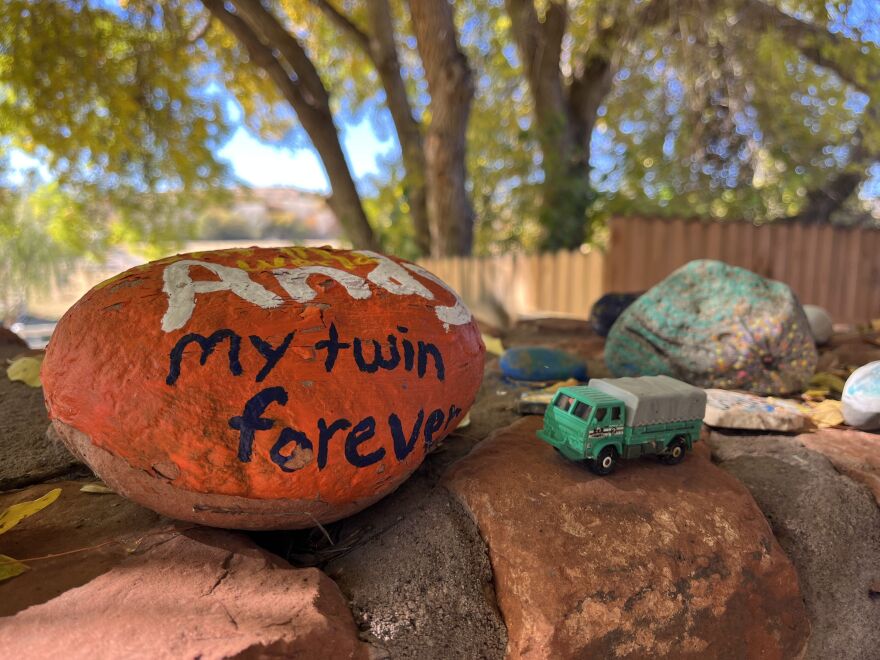Six years ago, a grief counselor began an unorthodox sanctuary for grieving people and abused animals in northern Arizona. She calls it a carefarm and it attracts hundreds of visitors a year from around the world who come to cope with the sorrow of losing a loved one and experience the transformational potential of animals and nature on broken hearts.
About a half-an-hour’s drive from the red rocks of Sedona, the Selah Carefarm offers refuge for those who’ve experienced the unimaginable. The 12-acre property is situated on a meandering section of Oak Creek. Next to an artesian spring, hundreds of small metal medallions hang from a tree-like steel structure and sway in the gentle breeze. Each bears the name of someone who’s died.

“This one is to Harley Quinn with her birthdate, and to Jordan with love from his dad, and to Jade Evelynn from her loving parents … Lots of children,” says Joanne Cacciatore.
She knows each medallion represents a world-shattering loss—events that’ve thrown open chasms of heartache. As a research professor at Arizona State University, author and the founder of the farm, she’s dedicated a quarter-century of her life to helping others cope with trauma.
“We intentionally create space to remember our beloved dead, because there’s never a time—especially when the loss is catastrophic—there’s never a time you stop missing them,” she says.
For those who’ve endured this anguish, the farm offers a peaceful refuge from the outside world. Yoga, meditation, art therapy and even kayaking are part of the program. And then there are the animals.
“Ahem … OK, let’s see if I can call the goats,” she says as she takes in a massive breath of air. “Goats! Hey goats!”

Sure enough, within seconds, a herd of about dozen of the eager creatures stampede in from a nearby pasture, hungry for attention. Cacciatore knows each by name along with their histories and personalities.
“Hi goats! Hi Captain, hi Marta, hi Obie, hi Curtie Curt!” Cacciatore exclaims as they swarm her.
The goats are among 50 animals that live at the farm. Nearly all, including horses, donkeys, alpacas and cows, have been rescued, most from violent and abusive situations. For many visitors, the animals prove to be perfect partners in grief.
“They’re not encumbered by the need to use language to make people feel better, or feel differently,” she says.
Nearby a bearded man in his 30s quietly repairs a water fountain for the horses. This is Erik Denton and emblazoned on his gray sweatshirt is a family photograph with the names Sierra, Joanna and Terry. These are his kids who were murdered last year, allegedly by their mother.

“I think they put me on about 10 different medications. All it was doing was just numbing me. I couldn’t even express how I was feeling, I was just stuck in my head,” he says.
In a haze of grief, Denton eventually made his way to the farm.
“It’s kind of its own little world, its little oasis here,” he says. “It’s just peaceful, down by the water, up in the sanctuary here with the animals.”
Each time Denton came here he found it harder to return to the real world. So, in October he moved to the area near Cornville and now works at the farm, doing maintenance and caring for the animals.

“So, the animals, you know, they don’t accidentally say things. They don’t say ‘good morning’ to you when you walk through the gate because not every morning is a good morning. I mean, how could mornings be good after, after you lose someone?” he asks.
Denton says in addition to the animals, the compassion and human connections he’s found at the farm have been crucial.
“This is the only place where I can kind of relax and focus and not feel just uneasy. I was just uneasy wherever I would go other than this place,” he says.
Denton’s grief is something Cacciatore can identify with. She lost a child nearly three decades ago and the tragedy set her on the path to becoming a grief counselor, starting a nonprofit and eventually founding the farm in 2016. She says the animals’ effects on those in mourning remains something of a mystery but observes it especially after intense counseling sessions.

“They come out and they come walk with the animals and the animals just bring a certain lightness to their bodies, right? They get a little space and then they can start to process some of the intensity they just experienced, which is really powerful,” she says.
Hundreds of people each year venture to the farm—most stay between three and 10 days. For them, Cacciatore has taken on the role of something like a grief guru, advocating for facing it head-on, and being there for those confronting the darkest moments of their lives.

“If we ever want to have peace in our homes, in our bodies and amongst nations we have got to start talking about grief. We have to,” she says.
And for her that process starts with the anguished people who make the pilgrimage here to remember, memorialize and work through their heartache in their own time.



